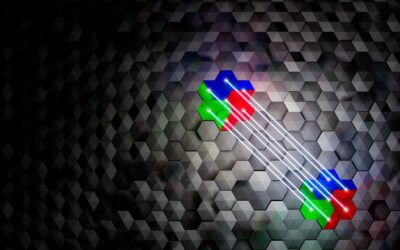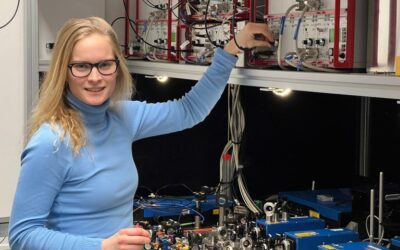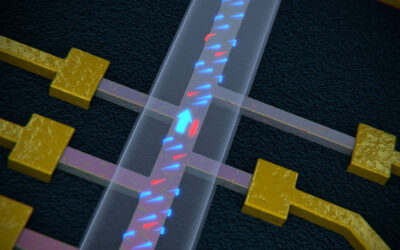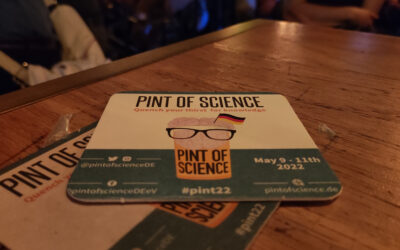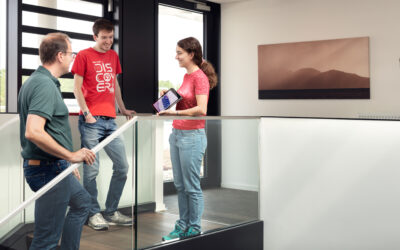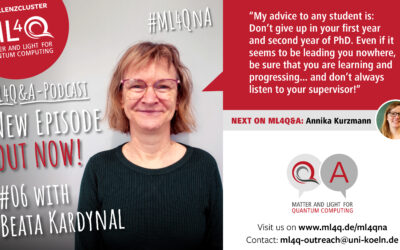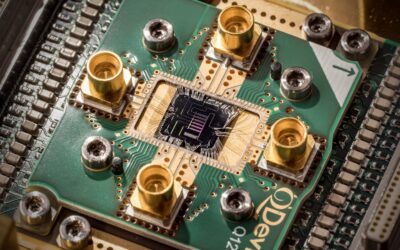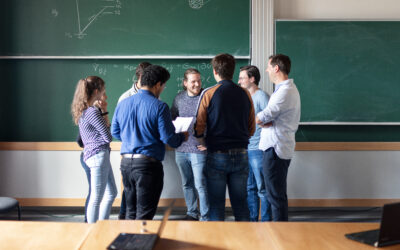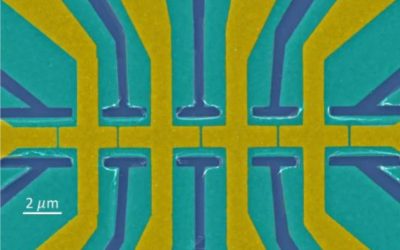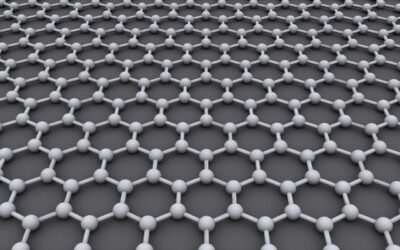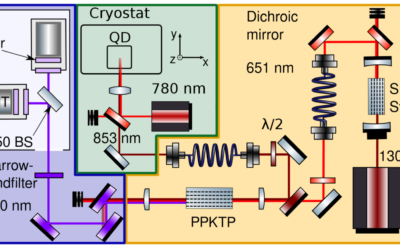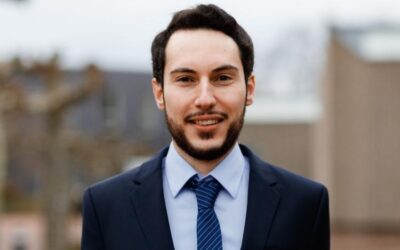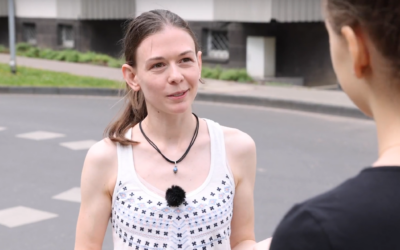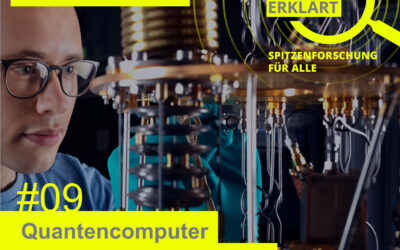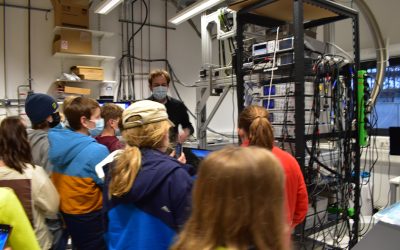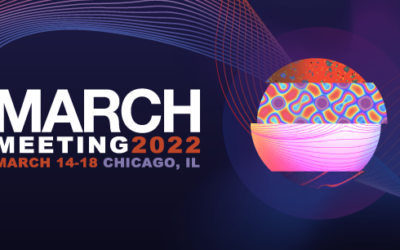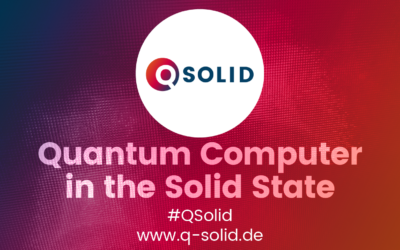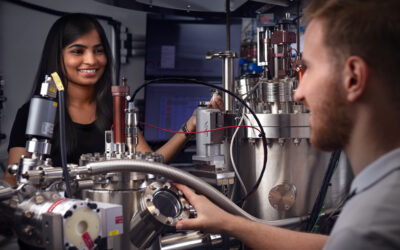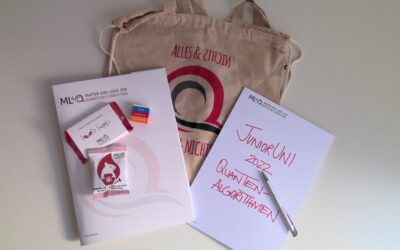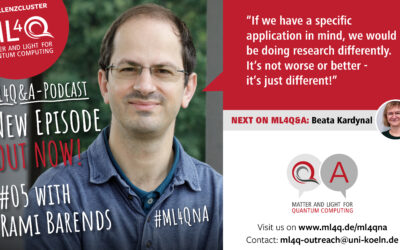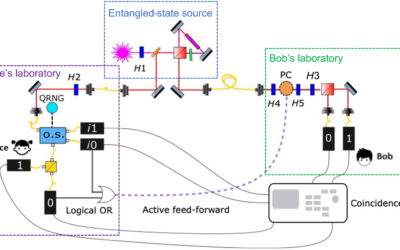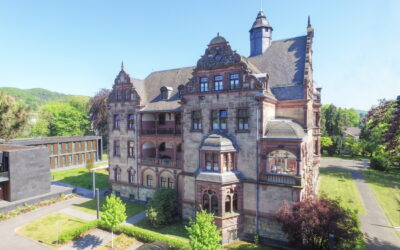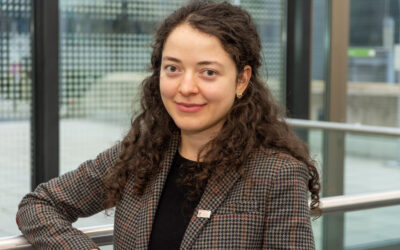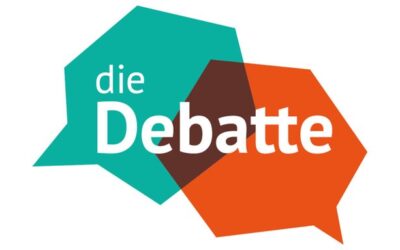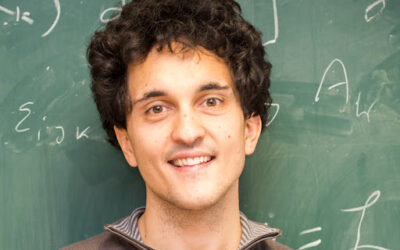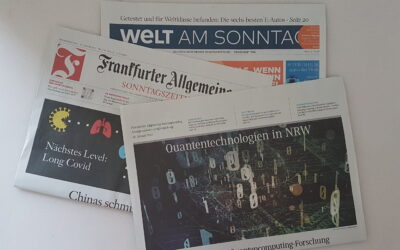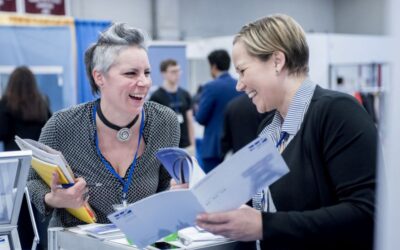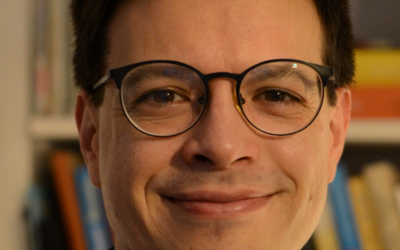News
Error-Free Quantum Computing gets real – Fundamental building blocks for fault-tolerant quantum computing demonstrated
Error-free quantum computing gets real Fundamental building blocks for fault-tolerant quantum computing demonstrated For quantum computers to be useful in practice, errors must be detected and corrected. A research group at RWTH Aachen University, in...
Nina Stiesdal is this week’s Physikerin der Woche
ML4Q associated member Nina Stiesdal is featured by the German Physical Society (DPG) this week in Physikerin der Woche. Since January 2018, the working group on equal opportunities of the DPG highlights weekly women in physics in Germany or German women in physics...
Quantum one-way street in topological insulator nanowires
Quantum one-way street in topological insulator nanowires Very thin wires made of a topological insulator could enable highly stable qubits, the building blocks of future quantum computers. Scientists see a new result in topological insulator devices as an important...
Back in the pubs again – ML4Q @ Pint of Science 2022
Round 100 guests met at Bumann & Sohn in Cologne on Monday to grab a beer and listen to the latest research news on quantum computers, brain research and aging. The evening was entitled: All in order? The audience looked at various phenomena from quantum...
Quantum Computing challenged by disorder – study published in Nature Communications
Research conducted in the ML4Q groups of Simon Trebst, Alex Altland and David DiVincenzo analyzed cutting edge device structures to demonstrate that some of them are indeed operating dangerously close to a threshold of chaotic meltdown. The challenge is to walk a thin...
ML4Q&A with Beata Kardynal
We continue to feature some of our experimental physicists. In this episode, we talk to Beata Kardynal, group leader at Forschungszentrum Jülich and at RWTH Aachen. We discuss her career and her training in electronic devices to using these devices to couple to...
First Hybrid Quantum Bit Based on Topological Insulators
First Hybrid Quantum Bit Based on Topological Insulators Scientists at Forschungszentrum Jülich take an important step on the path towards topological quantum computers With their superior properties, topological qubits could help achieve a...
QuantumGuide: Simon Stellmer coordinates newly funded QuantERA project
1.5 million euros for improved quantum sensors Physicists at the University of Bonn lead a new European QuantERA collaborative project They originate from the world of the smallest particles and have the ability to measure things with the highest...
Realization of proximity-induced superconductivity in a topological-insulator nanowire
The Ando group has developed a new methodology to realize proximity-induced superconductivity in a topological-insulator nanowire. The work was conducted in cooperation with the Ernst Ruska-Centre for Microscopy and Spectroscopy with Electrons at Forschungszentrum...
2D materials for next generation computing
In a compact comment published in Nature Communications, Max Lemme, Christoph Stampfer and colleagues outline the most promising fields of applications of two-dimensional (2D) materials, as well as the challenges that still need to be solved to see the appearance of...
Inter-site collaboration demonstrates wavelength conversion of single photons emitted by semiconductor quantum dots
Inter-site collaboration demonstrates wavelength conversion of single photons emitted by semiconductor quantum dots ML4Q researchers from Bonn and Jülich have published recent results in Optics Letters on wavelength conversion at the single-photon level - a...
Extremely compressible “gas of light”
Busley et al. bring these advantages to quantum gases of light and explore a textbook scenario: a two-dimensional, spatially uniform gas of bosons.[from Photons think inside the box, Perspective, Science 375 (6586), pp. 1355-1356, 2022]The group of Martin Weitz...
The Wilhelm and Else Heraeus Dissertation Prize goes to Federico Grasselli from the Bruß group
Since 2018, Heinrich Heine University Düsseldorf (HHU) and Bergische Universität Wuppertal (BUW) have been awarding the "Wilhelm and Else Heraeus Dissertation Prize" which is endowed with 4000 euros. ML4Q associated member Federico Grasselli received the award for...
Triff die Quanten-Girls! Melde Dich an zum Girls’Day 2022
MINT Fans und Teens aufgepasst! Am Girls'Day 2022 tauchen wir mit euch in die spannende Welt der Quantenphysik ein. Als kleinste, elementare Bausteine der Welt folgen die Quanten ihren ganz eigenen mysteriösen Gesetzen. Vieles aus unserem Alltag - wie z.B. Laser oder...
New video series: our research explained in 4 steps
Can you explain what you are doing in your PhD thesis in different levels of difficulty? Are you able to take your audience step by step into the details of your complicated thesis work? Here is how we challenged our researchers! In our video series Unsere Forschung...
Exzellent erklärt: ML4Q featured in the podcast of the Clusters of Excellence
On September 1, 2021, the first episode of the podcast of Germany's Clusters of Excellence was released: "Exzellent erklärt (excellenty explained) - cutting-edge research for all". The podcast on current scientific topics reflects the research diversity of the...
Children visit Cologne’s coolest spot
Photo galleryKölnerKinderUni 2022On March 15, Oliver Breunig, postdoc in the Ando lab at the Institute for Experimental Physics at the University of Cologne, invited children participating in the KölnerKinderUni (Cologne Children University) to visit Cologne's coolest...
Quantum Alliance at the APS March Meeting
ML4Q is attending the largest physics meeting in the world in 2022 as part of the Quantum Alliance! For the first hybrid March Meeting of the American Physical Society (APS), more than 12.000 physicists will get together online and in Chicago from March 14th to...
QSolid – Paving the Way for the First German Quantum Computer
Twenty-five German research institutions and companies are working on a quantum computer with improved error rates in the collaborative project QSolid.The project aims to develop a comprehensive ecosystem that will be integrated into Forschungszentrum Jülich’s...
EIN Quantum NRW – North Rhine-Westphalia joins forces to establish a hub for quantum science and technologies
EIN Quantum NRW North Rhine-Westphalia joins forces to establish a hub for quantum science and technologies Education, Innovation, Networking in quantum science and technology - these are the goals of the new quantum computing network "EIN Quantum NRW", which bundles...
Ein Tag auf der Suche nach der Nadel im Heuhaufen
Am 5. März 2022 waren 40 Schülerinnen und Schüler des Ferdinand Franz Wallraf Gymnasiums zu Besuch an den Kölner Physikalischen Instiuten. Im Rahmen der Kölner JuniorUniversität lernten die Oberstufenschüler:innen an ihrem Experimentiertag im Fach Informatik...
ML4Q&A with Rami Barends – tune in our new podcast episode!
ML4Q&A now moves on to feature some of our experimental physicists and we start with Rami Barends, recently appointed head of the Institute for Functional Quantum Systems at Forschungszentrum Jülich and associated member of ML4Q. Chris (postdoc in the Ando...
Observing the difference between quantum and classical causality
In an international multi-site cooperation, scientists from the ML4Q Cluster of Excellence are able to observe quantum effects in cause and effect relationship in a photonic experiment. Understanding causal relationships in the observed data is a deeply rooted concept...
Bad Honnef Summer School on Quantum Computing
In a joint effort between computer scientists (CASA Cluster of Excellence Bochum and University of Latvia) and physicists (David Gross from our cluster), a fantastic summer school program has been put together to introduce interested master students, PhDs and...
Mari Gachechiladze now appointed associate professor for Quantum Computing at TU Darmstadt
We are proud to announce that one of our cluster's early career scientists, Mariami Gachechiladze, has started her professorship for Quantum Computing at TU Darmstadt as of February 1, 2022. Mariami (to many of us just known as Mari) joined our cluster in its first...
Simon Stellmer und Tommaso Calarco bei “Die Debatte”
Im Februar 2022 standen die Quantentechnologien im Fokus von Die Debatte - mit Beiträgen unserer ML4Q-Mitglieder, Simon Stellmer und Tommaso Calarco. Die Debatte ist ein Projekt im Bereich der Wissenschaftskommunikation, das zu aktuellen Themen aus verschiedensten...
Call for the Federico Tonielli Award 2022 now open
Federico Tonielli was a PhD student at the Institute for Theoretical Physics in the group of Sebastian Diehl. He passed away suddenly and unexpectedly in June 2020 at the age of 27. In his honor, the Federico Tonielli Award will be offered this year for the second...
Quantum technologies in NRW – scientists present a rich research landscape
Quantum research in North Rhine-Westphalia is taking different paths to develop the most powerful freely programmable quantum computers. Numerous universities and research institutes are involved. Scientists from North Rhine-Westphalian universities in Aachen, Bochum,...
ML4Q @ MIT European Career Fair
ML4Q is participating as part of the Quantum Alliance at the MIT European Career Fair organized by Research in Germany on 17 February 2022. The ECF is the largest recruiting event in the United States for European companies and research institutions. It is the ideal...
New ML4Q Professor on board: David Luitz officially appointed at University of Bonn
David Luitz was appointed by the University of Bonn to start his ML4Q professorship as of January 1st. He will be leading the research group Theoretical Quantum Many-Body Physics focussing on condensed matter theory at the University of Bonn. David is moving to Bonn...
